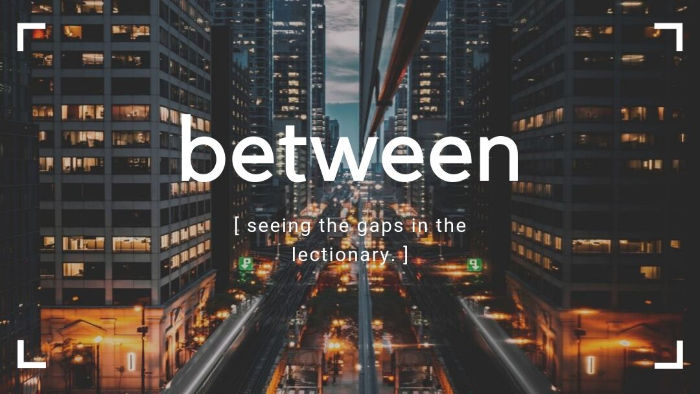A look at the gaps in the lectionary.
This week: the gap between Proper 23B + 24B
The text: Mark 10:32-34
This week, our lectionary skips over a small bit of text that the astute reader needs, but as is often the case, we can see why the people putting the lectionary together see as, perhaps, redundant or extraneous. Obviously, if you’ve been following me for awhile, you’ll know I think that is shortsighted. To jump on my soapbox very quickly, there is one important reason:
Many people feel their understanding of the Bible is lacking. Particularly when it comes to the shape of the story, its precise contents, and what it means.
So this little redundant bit is the third variation on a theme—and one that helps connect this bit of scandalous behavior to an ongoing problem for the disciples. It isn’t some random story of abstract value. It is tied into a whole sequence of tensions that plays out the theme that we explored this past Sunday: that the disciples are the children of God and also they are unable to be the hands and feet of Jesus because of their hubris.
Before the Third Prediction
Remember, after the second Passion prediction, the disciples argued about their greatness, how they rank in awesomeness. This vision isn’t just a ranking among themselves, but placing themselves above other people. So when they see someone who is not part of the team, they measure them as wrong and inferior and seek to stop them.
Jesus rejects this mindset and more or less tells them to get their heads out of their butts. Then some Jesus’s critics come along and ask a tricky question about marriage and divorce (a bit of a preview of what’s to come in Jerusalem) and Jesus teaches about their hearts—a spiritual successor to what he was just saying to his disciples.
Then, for a third time in a chapter’s time, Jesus blesses children and acknowledges their special place in the Kin-dom.
Lastly, we come to last week’s passage about the pious man who asks about inheriting eternal life: a story that isn’t about what to do but how faithful we are.
While our focus is always on the man, his lack, and his sadness at being told to get rid of his wealth or on the teaching about wealthy people having a hard time getting into heaven, it is the third part of the passage we most often miss: that Jesus instructs the disciples that they don’t get to have the assurance that the pious man is asking for—but that they have already possess the thing the man lacks because they are living without attachment to wealth and security.
And this is the key to that whole sequence: that they have it already. They are good. Just as they have already healed people like Jesus. Their present freakout and confusion is not based in reality, but in their assumptions. They are causing their own powerlessness—because they are focused on their greatness, superiority, the ladder of success, betterment, who is in … all of the human stuff that Jesus condemns.
In short, as long as Jesus was freeing them from the way of the world, they were free. Now, they are still free, but are now imposing a block on themselves.
The Third Prediction
This week’s Between text is the third Passion prediction. And, in the grand scheme of the story, I think this passage is essential, there are real preaching reasons why this is a mistake to drop these three verses. Because they offer a tantalizing mystery that fits right into the themes we’ve been working through for the last couple of months.
They were on the road, going up to Jerusalem, and Jesus was walking ahead of them; they were amazed, and those who followed were afraid. — Mark 10:32a
There is such richness here in its concision; like poetry.
They were amazed
and those who followed were afraid.
Those disciples who just argued about greatness and pushed to disempower a rogue exorcist and drive the children away, who remain so confused about the mission—they are amazed. And those who followed them were afraid.
What is going on here?
The easy answer, and I think the most obvious, is that they are now approaching Jerusalem, which itself isn’t a fear-inducing place. But they aren’t approaching as normal pilgrims. Do they still think they are an army? A rebel force intending to liberate the people through acts of guerrilla terrorism? And arriving without weapons?
All of the confusion that surrounds these predictions, that presents the disciples with choices they struggle to comprehend, but would if they listened to him rather than assume the way of the world is natural.
This should prepare us as readers for the disciples amazement and the crowd’s fear. Why the crowd understands something about Jesus that the disciples can’t see—and the disciples understand something about Jesus that the crowds can’t see—and that none of them fully prehend the moment.
Then Jesus lays out the events fully: that it will be the Temple authorities that condemn him, the Roman occupiers that torture and kill him, and that on the third day, God will raise Jesus from the dead.
This is the prediction that precedes the ignorant request from James and John. They ask to die with Jesus. Not out of love, but something akin to duty, but more like the achieving of glory—another method of greatness.
They once again understand by half. So, do we?
